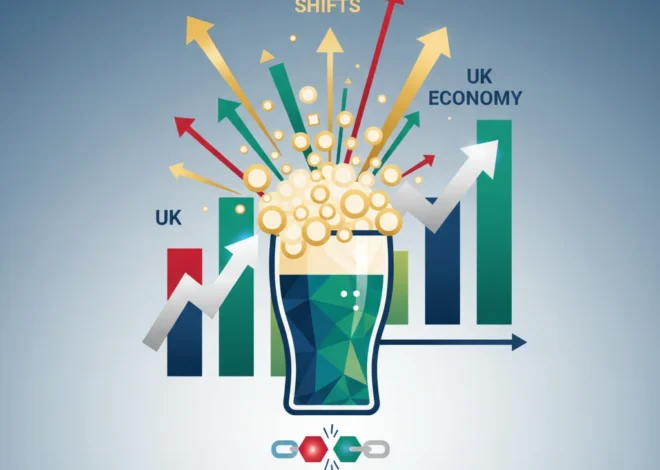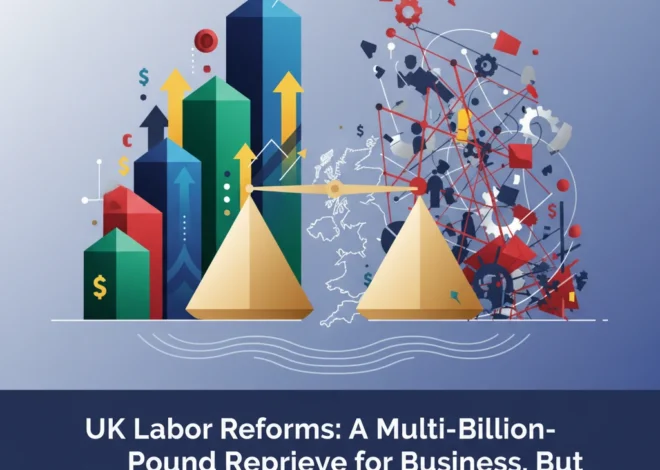
Labour’s Internal Tremors: Gauging the Economic Shockwaves for UK Investors
In the world of finance and investing, political headlines are more than just noise; they are leading indicators of potential market volatility and shifts in economic policy. The recent reports of internal strife within the UK’s Labour Party, detailed in a Financial Times article, are a case in point. While the party maintains a commanding lead in the polls, whispers of a leadership challenge against Sir Keir Starmer and growing frustration among his MPs signal an undercurrent of instability that investors and business leaders cannot afford to ignore.
This isn’t merely about political theatre. With a general election on the horizon, the internal dynamics of the government-in-waiting have profound implications for the future of the UK economy, fiscal strategy, and the investment landscape. The key question for anyone with capital at stake is: What do these political tremors mean for economic stability and future policy direction?
The Fault Line: Policy U-Turns and Leadership Doubts
At the heart of the disquiet is a perceived lack of clear ideological direction and a series of high-profile policy reversals. The most significant of these was the decision to scrap Labour’s flagship £28bn-a-year green investment pledge. While positioned by the leadership as a pragmatic response to the country’s fiscal constraints, the move has been interpreted by many within and outside the party as a retreat from bold, investment-led growth.
This single decision has sent ripples across multiple sectors. For those focused on green finance and ESG (Environmental, Social, and Governance) investing, it raises questions about the UK’s commitment to becoming a leader in the green transition. For the broader business community, it creates uncertainty. If a cornerstone policy can be abandoned so readily, what other commitments might be subject to change? This unpredictability is anathema to long-term capital investment and strategic business planning.
The frustration among Labour MPs, as reported by the FT, is palpable. They see a party with a significant poll lead acting with a timidity that could undermine its mandate for change. This has fueled speculation about potential challengers, with allies of shadow health secretary Wes Streeting being forced to deny he is preparing a leadership bid (source). While Starmer has vowed to “fight on,” the very existence of these conversations points to a leadership struggling to command complete authority, just as the country approaches a crucial pre-election Budget.
Forging the Future: Why AI and Mortgages in UK Schools is a Game-Changer for the Global Economy
Key Players and Their Economic Implications
To understand the potential economic futures under a Labour government, it’s essential to analyze the key figures at the center of this dynamic. Their perceived economic philosophies offer clues as to where policy might head, depending on who holds the most influence.
Here is a breakdown of the key players and what their ascendancy could mean for the financial world:
| Key Figure | Perceived Economic Stance | Key Policy Association | Implications for Business & Investors |
|---|---|---|---|
| Sir Keir Starmer (Leader) | Pragmatic Centrist / Cautious | “Securonomics”; fiscal discipline; stability over radical change. | Seeks to project stability and predictability to markets. Aims to avoid fiscal shocks, which could mean slower public investment growth but a more stable environment for banking and large corporations. |
| Rachel Reeves (Shadow Chancellor) | Fiscal Conservative / “Iron Grip” | Strict fiscal rules; emphasis on balancing the books; “making, buying, and selling more in Britain.” | Reassuring for bond markets and those concerned about national debt. However, her strict rules may limit scope for stimulus, potentially impacting growth-focused sectors and public-private partnerships. |
| Wes Streeting (Shadow Health Sec) | Pro-Market / Reformist | Advocacy for private sector involvement in public services (e.g., the NHS); seen as an heir to the “New Labour” Blairite tradition. | A Streeting-influenced government might be more open to private finance initiatives and market-based solutions, creating opportunities for investors in healthcare, infrastructure, and outsourced services. |
From Macroeconomics to Sector-Specific Impact
The consequences of this internal political maneuvering extend beyond macroeconomic policy and into specific, high-growth sectors that are critical to the UK’s future prosperity. The stability and vision of a government directly influence the regulatory and investment climate.
Financial Technology (Fintech) and Banking
The UK’s status as a global fintech hub is built on a foundation of progressive regulation, access to capital, and political stability. An incoming government perceived as internally divided or uncertain in its policy direction could chill investor sentiment. The world of financial technology thrives on clear, long-term regulatory roadmaps. Questions over tax policy, R&D credits, and the digital pound will need decisive answers, which a weakened leadership may struggle to provide. For the established banking sector, while stability is paramount, a lack of a clear growth agenda from the government could lead to economic stagnation, impacting lending and profitability.
Trading, Blockchain, and the Innovation Economy
Market trading desks react in real-time to political news. The pound sterling and UK government bonds (gilts) are particularly sensitive to perceived political risk. The mere rumor of a leadership challenge in a party poised for power can cause currency fluctuations and a rise in borrowing costs. According to the FT, Starmer’s team is keenly aware that they must project an image of competence to avoid spooking the markets (source).
For nascent industries like blockchain and digital assets, the stakes are even higher. These sectors require a government that is not only stable but also forward-thinking and willing to engage in creating sophisticated regulatory frameworks. A government consumed by internal battles is less likely to have the bandwidth or political capital to champion complex, future-focused industrial strategies. This could see the UK lose ground to more agile regulatory regimes in Europe, Asia, and the Middle East.
Conclusion: Why Investors Must Watch Westminster Closely
The internal politics of the UK Labour Party are far more than a Westminster soap opera. They are a crucial barometer for the future direction of the UK economy. For investors, finance professionals, and business leaders, the current tensions highlight several key takeaways:
- Policy Risk is Real: The reversal of the £28bn green pledge demonstrates that even major policy commitments are not set in stone. Businesses and investors must factor this heightened policy uncertainty into their risk assessments.
- Leadership Matters: The ideological differences between key figures like Starmer, Reeves, and Streeting are not trivial. The outcome of this internal power dynamic will shape fiscal policy, industrial strategy, and the UK’s relationship with the private sector for years to come.
- Stability is the Ultimate Commodity: In a fragile global economy, markets will reward predictability and punish instability. A party that appears divided before it even takes power sends a worrying signal to international investors, potentially impacting everything from currency strength to the cost of government borrowing.
As the UK gears up for a general election, the focus should not just be on the polls, but on the coherence and stability of the likely victor. The battles being fought inside the Labour Party today will define the economic landscape of tomorrow. For anyone involved in investing or business in the UK, watching these developments isn’t optional—it’s an essential part of due diligence.
The High Street's Shadow Economy: Unpacking the Financial Underbelly of Illicit Mini-Marts


